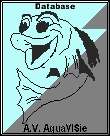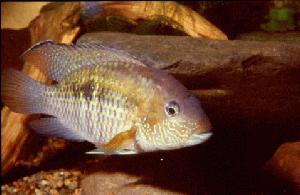 |
Andinocara sapayensis |
 |
||||||||||||||||||||||
|
|
|
|||||||||||||||||||||||
| Explanation of the symbols | ||||||||||||||||||||||||
|
|
|
|||||||||||||||||||||||
 |
|
|||||||||||||||||||||||
|
As a youngster this fish is rather quiet and peaceful. but
as an adult he becomes more aggressive. The tank should be planted on the sides and background and must be large and
have plenty of caves and nooks to hide in. You can use
driftwood and stones.
They are omnivorous and will accept all types of live and frozen food. Dry food is also accepted. The best way for a planned spawn is to raise a group of unrelated juveniles to sexual maturity and allow them to pair off. The best pair should be chosen for breeding and other pairs should be removed. Up to 400 eggs are laid and fertilized on a flat stone that is carefully cleaned. After four days they hatch. Then the fry is moved several times a day to a pit by the female. The male defends the territory. Four days later the young fishes are swimming free. The fry can be raised on baby brine shrimp. |
||||||||||||||||||||||||
|
|
||||||||||||||||||||||||
|
Alf Stalsbergg |
||||||||||||||||||||||||
|
|
||||||||||||||||||||||||
|
Copyright ©AV AquaVISie. All rights reserved. |
||||||||||||||||||||||||